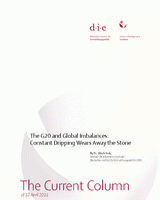The G20 and global imbalances: constant dripping wears away the stone
Volz, UlrichThe Current Column (2011)
Bonn: German Development Institute / Deutsches Institut für Entwicklungspolitik (DIE) (The current column of 18 April 2011)
Bonn, 18 April 2011. Last year Martin Wolf of the Financial Times likened the problem of global imbalances to Aesop’s fable of the grasshopper and the ant. Surplus countries such as China, Germany and Japan are populated by assiduous and hard-working ants that are producing and exporting goods, while deficit countries such as the U.S., the UK, Spain and Greece have been consuming like the blithely grasshoppers, financing their imports on credit from the ants. Like in Aesop’s fable, the grasshoppers’ carefree behaviour could not last forever in the real world: following the global financial crisis, deficit countries are under pressure to reduce their debt and current account deficits. But this requires adjustment also from the ants, i.e. the surplus countries, which ought to reduce their export dependency and stimulate domestic demand. Alas, there is no agreement between ants and grasshoppers as to how the necessary adjustments should occur.
Since a reduction of global macroeconomic imbalances is an important precondition for balanced and sustainable global growth, the group of 20 leading economies (G20) has sought to address this problem. However, as could be expected, the negotiations of the world’s most important grasshopper and ant colonies are proving to be challenging.
The topic of global imbalances was high on the agenda once again last Friday when the G20 finance ministers and central bank governors met in Washington, D.C. A few days earlier, on Monday, the International Monetary Fund (IMF) had published its World Economic Outlook report, where it stated that “global demand rebalancing is not progressing”. For instance, the U.S. deficit and Chinese surplus are roughly similar to where they were at the time of the G20’s Pittsburgh Summit in September 2009. In Pittsburgh, the G20 initiated a Mutual Assessment Process (MAP), in which the IMF shall analyse whether the policies of G20 members are consistent with the common goal of ensuring a lasting recovery and strong and sustainable growth over the medium term.
Negotiations over the MAP have advanced only slowly. First progress was made at the meeting of G20 finance ministers and central bank governors in Paris in February 2011, when they agreed on a set of indicators that shall help to identify persistently large imbalances that require policy action. Besides public debt, fiscal deficits, the private savings rate and private debt, the indicators also include the external imbalance composed of the trade balance and net investment income flows and transfers, under consideration of exchange rate, fiscal, monetary and other policies.
A major step forward was made on Friday, when the G20 finance ministers and central bank governors agreed on the procedure through which the macroeconomic imbalances and policies of individual G20 countries should be screened. In particular, they agreed on “indicative guidelines” against which each of the indicators will be assessed by the IMF. The indicators will be gauged through different methods, taking into account economic theory and historical norms as well as comparisons with other G20 countries to see whether policy action is required. Country specific factors, such as a country’s demographic development or its role as an oil exporter, will be taken into account. While the guidelines are explicitly not defined as policy targets, they establish reference values, and countries with large deviations will undergo an in-depth assessment by the IMF in a second step. According to Friday’s G20 communiqué, the analysis will include monetary and exchange rate policies – by far the most controversial policy fields among the G20.
The IMF will initially assess seven G20 members: China, France, Germany, India, Japan, the UK and the U.S. The G20 finance ministers and central bank governors are expected to discuss the IMF’s findings at the Annual Meeting of the IMF and the World Bank in September 2011, before they will feed into the G20 Summit of the heads of state and government in Cannes on 4 November 2011. Even if the IMF’s policy recommendations coming out of this process are not binding and governments are basically free to accept or ignore them, the IMF’s analysis can nonetheless help to de-politicise the controversy over global imbalances and help to gradually narrow the divide between different G20 members through a fact-based discussion.
It would be illusionary to expect a drastic change of policy stance from any individual country as a result of the G20 negotiations. Governments will only adjust their policies when they see tangible benefits arising for their own country. China, for instance, once more made clear in Washington that it will not change its exchange rate policy because of pressure from the other G20s. A repetition of the Plaza Agreement of 1985, at which the then G5 (the Federal Republic of Germany, France, Japan, the UK and the U.S.) agreed on an appreciation of the Japanese Yen and the German Mark against the U.S. dollar, will not happen.
Neither ants nor grasshoppers will change their true nature. But instead of continuing the blame game the newly agreed G20 process provides the opportunity to constructively address divisions and try to put the world economy on a sounder footing. And this is certainly in the mutual interest of ants and grasshoppers alike.
